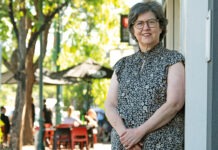Recently appointed PSA President Dr Fei Sim and new Federal Health Minister Mark Butler have used their opening addresses at PSA22 to lay out their priorities for pharmacy in coming years.
Dr Sim opened the annual conference – the first to be held in person in 3 years – by paying tribute to the efforts of pharmacists throughout the COVID-19 pandemic.
‘Pharmacists, as a profession, stood up when it mattered. We showed agility, tenacity and reliability,’ she said.
‘We adapted and innovated our practice to meet the challenges of the pandemic and serve our health system.
‘The pandemic has highlighted community pharmacists’ role as essential primary healthcare providers, and we became the first point of contact for many in our communities. No matter the circumstance, pharmacists continued to show up, serve and make a positive impact.’
Dr Sim also paid tribute to the efforts of her predecessor, PSA Immediate Past President Associate Professor Chris Freeman and the strides the profession has made despite the tumultuousness of recent years, including:
- having medicine safety recognised as a National Health Priority Area by the Federal Government, bringing it to the forefront of national health policy
- securing more than $345 million to fund on-site pharmacists in residential aged care facilities
- expanding access to vital vaccinations, with more than 10 million COVID-19 and influenza vaccinations already administered this year
- the launch of four Medicine Safety reports, highlighting key opportunities for progress.
Focus for the future
‘I look forward to working with our government and the [federal Department of Health] so that pharmacists can play an even greater role in our health system,’ Dr Sim said.
‘My immediate advocacy priorities are furthering our medicine safety agenda, implementing the On-site Aged Care Pharmacist Program, integrating community pharmacists into primary healthcare, improving pharmacist remuneration and driving workforce capability, and leading PSA to have a global impact and fulfil our social responsibility to our region.’
Acknowledging the difficulties pharmacists face in trying to do so much for so many, she urged pharmacists to keep in mind the impact they had on individual patients.
‘We are making a huge difference in each and every one of our patients’ lives, every single day,’ she said.
‘We need to come together as pharmacists, and work collaboratively with the healthcare sector more broadly, so that we, as a profession, can make an even greater impact on the health and wellbeing of Australians.’
The triple whammy
Dr Sim also discussed the ‘other’ triple whammy.
‘It’s not about the concurrent use of an ACE or ARB, a diuretic and an NSAID,’ she said.
‘The triple whammy I am referring to is the triple whammy of my life – it’s age, gender and cultural background. At 36, I am young, relatively speaking, and am often told I look younger than I am. I am a woman. And I’m from a diverse cultural background – English was my second language.
‘These are all things, unfortunately, that I have to battle with in my life, professionally and socially.’
Addressing any pharmacist who shared one or more of these whammies, she urged them to focus on things in their control – developing professional skills, cultivating a growth mindset and building resilience.
‘The triple whammy we should be known by … is our capability, courage, and compassion,’ Dr Sim said.
‘So, next time when we see each other, can we please put our age, gender and any diversity aside, and look at us, and look at our qualities – our capability, courage and compassion.’
Next on the horizon
In his first major speech to the health sector, recently appointed Federal Minister for Health and Aged Care Mark Butler acknowledged the irreplaceable role pharmacists play in the healthcare sector.
‘It has been a really tough 2.5 years, and there has been no more accessible place to go when people need health advice or when they need some support,’ he said.
Throughout the pandemic pharmacists have been a trusted source of advice and care. Thank you for all the work you do to keep our community safe. @PSA_National #PSA22SYD pic.twitter.com/jOuRL81PtU
— Mark Butler MP (@Mark_Butler_MP) July 29, 2022
Mr Butler spoke of his pride in the universality of our healthcare system, but also his firm focus on affordability.
‘I know talking to pharmacists who have to deal with general patients coming through their daily doors all the time, that many thousands of people … are often making really tough decisions about which script they get filled,’ he said.
‘The ABS said that around 900,000 patients every year are going without a script that their doctor has said to them is critical to their health.
‘I’ve heard you tell me these stories. They say, “Look, I’ve got these two or three scripts, which one do you think is most important?”.’
Mr Butler said Australia had to do better than that, which is why from 1 January 2023 the Pharmaceutical Benefits Scheme price cap will be cut from $42.50 to $30.
‘I’m aware of the discounting arrangements that operate in different pharmacies, and we’re designing the legislation [to ensure] that scripts that are currently discounted, will still be able to be discounted, given the change in the general patient rate, and still count towards the safety net,’ he said.
Mr Butler also officially launched a consultation paper to start the process of delivering on the promised $345.7 million project to fund on-site aged care pharmacists.
‘We’re going to have to engage in the process of pretty quick co-design and that’s going to involve close engagement with PSA,’ he said.
‘We’ve got to define the role of the on-site pharmacist. We’ve got to ensure that we’re very clear about training requirements for those pharmacists who will be working in residential aged care. Funding models will be important, and also ensuring that we’re able to measure health outcomes, make sure that this investment delivers better outcomes for people living in residential aged care.’
Mr Butler acknowledged that PSA’s inclusion as a signatory on the 7th Community Pharmacy Agreement was a very positive move, and confirmed PSA would be a signatory on 8CPA.
He also flagged his desire for deeper discussions around pharmacy and broader healthcare sector workforce planning.
‘It doesn’t make sense to me as demand for healthcare is climbing dramatically, and we continue to have constrained supply of health workforces not to have every single healthcare professional, whether they’re doctors, nurses, allied health professionals or pharmacists working as close as possible to the top of their scope of practice,’ he said.
@Emma4Dobell highlighting the role of pharmacists in mental healthcare. Thanks for all of your ongoing support for progressing this Emma! @PSA_National #PSA22SYD pic.twitter.com/EVLLPRATxK
— Claire O'Reilly (@oreilly_claire) July 29, 2022
Assistant Minister for Mental Health and Suicide Prevention, and Rural and Regional Health, Emma McBride MP MPS, a long-time PSA member also spoke about the significant role of pharmacists and the importance of allowing them to practice to top of scope at the opening plenary.
‘I want to encourage you to use your voice,’ she said, encouraging pharmacists nationally to speak up and advocate for all we can do to support the health of those in our communities.



 Kelly Abbott MPS[/caption]
Kelly Abbott MPS[/caption]


 Owner of Canberra's Capital Chemist Southlands Louise McLean MPS.[/caption]
Owner of Canberra's Capital Chemist Southlands Louise McLean MPS.[/caption]

 Supplied by CSL Seqirus[/caption]
Supplied by CSL Seqirus[/caption]










